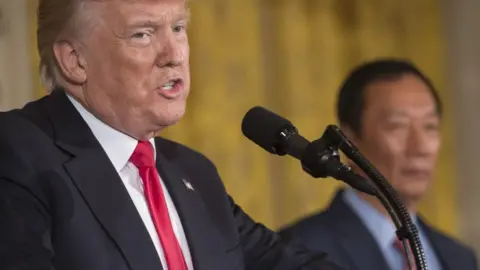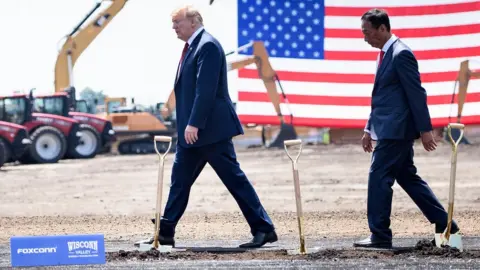Foxconn reconsiders Wisconsin factory plans
 AFP/Getty
AFP/GettyFoxconn, which raised hopes of a US manufacturing revival by announcing a new factory in Wisconsin, is now reconsidering its plans.
The Taiwanese manufacturing giant no longer expects to make liquid crystal display panels at the Wisconsin plant, a company official told Reuters.
It plans to hire mostly engineers and researchers not manufacturing workers.
The changes are a significant shift from the firm's plans announced at a White House ceremony in 2017.
At the time, US President Donald Trump claimed credit for landing the investment, which he said was a sign his policies were returning investment to the US.
The yet-to-be-built facility was the "eighth wonder of the world", he said at a groundbreaking ceremony last summer.
Foxconn, a major Apple supplier, had pledged to invest $10bn (£7.6bn) in the plant, which was expected to initially employ 3,000 people, with a potential for up to 13,000, mainly entry-level jobs.
New realities
In a statement on Wednesday, Foxconn cited a changed global marketplace, saying all of its projects are being "adjusted to meet these new realities."
"We remain committed to the Wisconsin Valley Science and Technology Park Project, the creation of 13,000 jobs, and to our long-term investment in Wisconsin. As we have previously noted, the global market environment that existed when the project was first announced has changed," the company said.
The state of Wisconsin had agreed to support the project with controversial incentives worth more than $3bn.
Critics of those incentives had long said they did not think that Foxconn would deliver on its promises.
The firm has already fallen short of yearly hiring goals, preventing its receipt of tax credits last year.
 Getty Images
Getty ImagesLouis Woo, special assistant to Foxconn boss Terry Gou, told Reuters that the firm was still evaluating options for Wisconsin - including creating a "technology hub" made up largely of research facilities for high-tech products aimed at health care, industrial.
But he said high labour costs in the US meant making advanced TV screens didn't make sense.
"In terms of TV, we have no place in the US," he told Reuters. "We can't compete."
